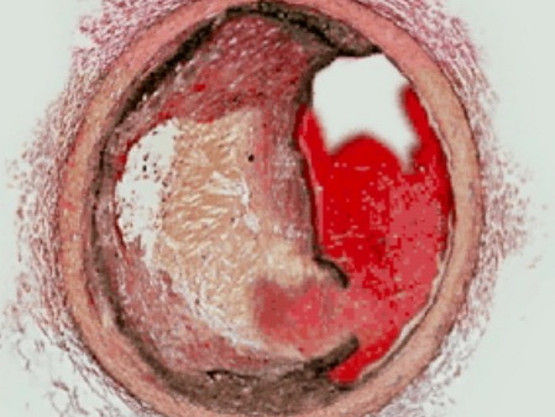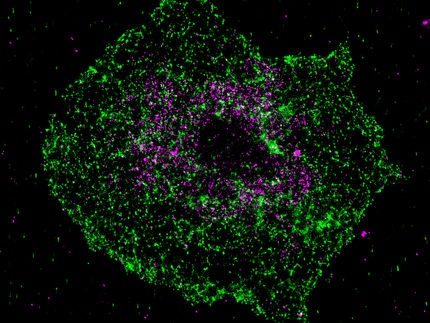How gut bacteria affect the risk of heart attack
Researchers from Charité - Universitätsmedizin Berlin and the Berlin Institute of Health (BIH) along with colleagues from the Cleveland Clinic in Ohio, USA have shown that certain bacterial metabolic products in the intestine increase the risk of suffering a heart attack or stroke. This applied, in particular, to patients who had already suffered a stroke. The published findings could help to develop completely new options for prevention.

Plaque rupture with clot formation in a coronary vessel.
Landmesser, BIH
Each year, 10,000 people suffer a heart attack in Berlin alone, and across Germany, the number is around 280,000, resulting in roughly 50,000 deaths. The known causes include high blood pressure, high cholesterol levels in the blood, smoking, obesity, lack of exercise or a history of heart attacks in the family. Patients who have already suffered a “cardiovascular event”, i.e., a heart attack or a stroke, are particularly at risk. BIH-Professor Ulf Landmesser, Medical Director Medical Department of Cardiology at Campus Benjamin Franklin of Charité and Medical Director of CharitéCentrum for Cardiovascular Diseases, worked with colleagues from the Department of Cardiovascular Medicine at the Cleveland Clinic in Ohio, USA and Professor Matthias Endres and his colleagues from the Department of Neurology at Charité and Hannover Medical School, in two studies with over 600 patients who had recently suffered a stroke, to examine a risk factor that had previously remained under the radar to researchers: what is called microbiome or gut bacteria. In particular, the studies measured the concentration of a metabolic product of the bacteria, trimethylamine oxide, and compared the risk of suffering a heart attack or stroke. “We discovered that patients with a high concentration of trimethylamine oxide in the blood had anywhere from two to five times the risk of a heart attack or stroke than patients with a low concentration of metabolites,” says Landmesser. Trimethylamine oxide apparently causes cells on the inner lining of blood vessels, endothelial cells, to create the conditions that promote blood clotting and vascular inflammation. This, in turn, attracts pro-inflammatory blood cells, monocytes, which can promote atherosclerosis and thrombosis in the blood vessel walls. This is hardly a new idea according to Landmesser: “The idea that inflammation is connected to atherosclerosis goes back to Rudolf Virchow, who wrote about this 160 years ago here in Berlin.”
The finding that there is a connection between microbiome and hearts attack or strokes, however, offers new possibilities to prevent heart attacks and strokes. The Berlin physicians created an international trans-Atlantic research network of excellence with their colleagues from Cleveland to look for substances that can inhibit the formation of harmful metabolites in the bacteria. “Conventional drugs that inhibit blood clotting can reduce the risk of heart attack, but at the same time they increase the risk of bleeding,” explains Landmesser. “The interesting thing about this new approach is that it could reduce the risk of heart attack and stroke by influencing the bacteria without having to increase the risk of bleeding at the same time. It could be a particularly elegant way of achieving our goal.”
Landmesser is planning on already testing the findings in the next three years in a clinical study on patients. But that is not all: “We have found even more interesting metabolites in the microbiome which positively affect cholesterol metabolism. Such a bacteria metabolite could be administered orally as a food additive, which would then lower the risk of heart attack.” Landmesser also points out that it would be completely wrong to demonize all the other bacteria in the intestine. “We have more bacteria in us than somatic cells. And these bacteria also do many things that are good for us. We want to also explore these and possibly use them for preventive approaches.”



















































